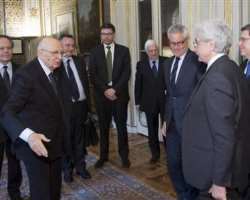Italy's 'Wise Men' Seek To End Political Crisis; President Gloomy

Italian President Giorgio Napolitano expressed despair on Tuesday at fierce criticism of his latest plan to end a post-election deadlock that has raised fears of months of instability in the euro zone's third largest economy.
Two groups of "wise men" appointed by Napolitano to try to forge a policy compromise between squabbling parties to end the impasse since the February 24-25 election started work on Tuesday. Napolitano said they would report back in 8-10 days.
The 87-year-old head of state reacted angrily to suggestions from the center-right of Silvio Berlusconi that his plan, which came after all other efforts to find a government failed, were a useless waste of time which the economy could ill afford.
"After seven years I am ending my mandate in a surreal way, finding myself the subject of absurd reactions, suspicions and incomprehensible paranoias, from the harmless to the unhinged," Napolitano was quoted as saying by Corriere della Sera daily.
Italy is deep in its longest recession for 20 years and although markets have so far remained relatively sanguine about the political deadlock, the economy desperately needs a stable government to unblock decades of sluggish growth.
There are also fears Italy's borrowing costs could shoot up dangerously if the impasse finally starts to spook investors.
Since the election, the parties have refused to budge at all from irreconcilable positions that "made one despair of the possibility of governing this country," Napolitano said.
Even the experts themselves seemed pessimistic about their chances of success and Napolitano's move may be aimed more at letting the situation "decant" for a bit longer in the hope that the parties will finally agree to a compromise.
Napolitano appointed the commissions after center-left leader Pier Luigi Bersani failed to gather enough support for a government despite a week of efforts.
The president's own attempt to dislodge the parties from entrenched positions also faltered last Friday.
The election resulted in three main blocs, none of which has enough support in parliament to govern alone. The center-left holds a majority in the lower house but not in the Senate.
TWO WORKING GROUPS
The two working groups, one of which will discuss social-economic reforms and the other institutional changes headed by a new electoral law, include representatives of the main center-left and center-right blocs, the head of the national statistics agency, legal experts and a senior Bank of Italy official.
Berlusconi's center-right has been particularly harsh in its criticism of Napolitano's move - unusual in a country where the president enjoys huge respect and deference.
They say that either Bersani agrees to a broad alliance with them or the country should return to the polls in June, apparently reflecting Berlusconi's fears that the center-left is plotting to appoint a leftwing successor to Napolitano in May.
Bersani on Tuesday again rejected a governing coalition with Berlusconi and said new elections would not fix Italy's problems. He also said Berlusconi's attempts to pick the new president were "unacceptable".
Napolitano's wise men idea was also criticized by populist 5-Star Movement leader Beppe Grillo who called the experts "domestic carers for democracy".
"At the end of the day what is it? A fake coalition government ruled by the president? I have seen the names but my puzzlement remains," Grillo's Senate leader Vito Crimi said.
One of the experts, constitutional judge Valerio Onida, shot back at Grillo: "In this parliament, they need babysitters more than carers."
But he added that he was "not too optimistic" about finding consensus.
The government-forming crisis is now inextricably bound up with a vote next month by both houses of parliament and regional representatives to replace Napolitano by May 15.
Berlusconi's People of Freedom (PDL) party fears that if no agreement is reached on a government then Bersani could ally with Grillo to appoint a new president hostile to the media magnate, who is seeking immunity from a string of legal cases.
The 76-year-old billionaire is facing an imminent verdict in a trial for paying for sex with an underage prostitute as well as in his appeal against a four-year tax fraud sentence and has large business interests to protect.
Respected political commentator Massimo Franco said fears over the presidential election would explain Berlusconi's pressure for the working groups to finish quickly.
"Above all he suspects a successive phase marked by a Quirinale (presidential palace) hostile to the PDL," Franco wrote in a column in Corriere della Sera .
Napolitano, who cannot call elections in the final months of his presidency, may also be trying to draw things out so that the key decisions are taken by his successor, insiders say.
Details of what the two commissions will propose have not been announced, but they are also likely to include cutting the cost of the bloated political system and reforms to unblock Italy's notoriously stagnant growth.
The key reform is changing the much maligned electoral law which is a major cause of the current impasse, but the politicians failed to agree on new rules despite repeated promises during the outgoing technocrat government of Mario Monti.
Another election with the same law could produce a similar impasse, experts say, but such a reform of the rules would be improbable by June.
One of the members of Napolitano's commissions, center-left Senator Filippo Bubbico, said they would also discuss easing painful tax hikes imposed by the outgoing technocrat government of Mario Monti. "We will work fast," he promised.
Anger over the economic pain imposed by Monti, particularly a hated housing tax, pushed many voters to support Grillo in the election, where his group won an unprecedented 25 percent.
REUTERS
